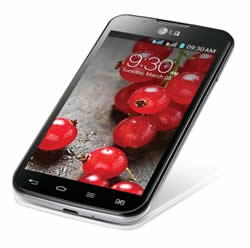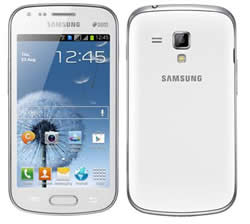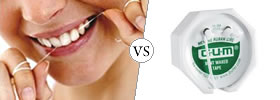Difference between LG Optimus L7 II Dual and Samsung Galaxy S Duos
Key difference: The LG Optimus L7 II Dual is a mid-segment phone from LG. The phone is a dual SIM phone. The device features a 4.3 inch IPS LCD, capacitive touchscreen with a resolution of 480 x 800 pixels. It runs on Android v 4.1.2 (JellyBean), which is backed by 1.0 GHz Dual-Core Qualcomm MSM8225 Snapdragon processor and 768 MB of RAM. Samsung Galaxy S Duos is a dual-SIM phone that was launched in September 2012. The phone comes with a 4-inch TFT capacitive touchscreen, with approximately 233 ppi density. The device comes with Samsung’s TouchWiz UI on Android 4.0.4 ICS.
 LG Electronics is a business segment of LG Corporation. LG Corporation is the fourth-largest conglomerate in South Korea. It is known for its various products, such as home appliances, TV and Home Entertainment products, computer products, etc. One of these product segments includes mobile phones, namely the LG Optimus series. Some of the newer phones under this brand include LG Optimus G, LG Optimus L5, LG Optimus L7, etc. LG also recently announced the LG Optimus L7 II Dual.
LG Electronics is a business segment of LG Corporation. LG Corporation is the fourth-largest conglomerate in South Korea. It is known for its various products, such as home appliances, TV and Home Entertainment products, computer products, etc. One of these product segments includes mobile phones, namely the LG Optimus series. Some of the newer phones under this brand include LG Optimus G, LG Optimus L5, LG Optimus L7, etc. LG also recently announced the LG Optimus L7 II Dual.
The LG Optimus L7 II Dual is a mid-segment phone from LG. The phone is a dual SIM phone. The device features a 4.3 inch IPS LCD, capacitive touchscreen with a resolution of 480 x 800 pixels. It runs on Android v 4.1.2 (JellyBean), which is backed by 1.0 GHz Dual-Core Qualcomm MSM8225 Snapdragon processor and 768 MB of RAM. The phone also has Adreno 203 for graphics support. The phone comes with a 2460 mAh Li-Ion battery.
The phone features an 8-megapixel camera with autofocus and LED flash, as well as a secondary VGA camera for video calling and self shots. The primary camera can record videos at 720p resolution with 30fps frame rate, which is quite a decent video resolution. The phone also supports various camera features such as geo-tagging, zoom, Normal shot, Panorama, Continuous shot, Portrait, Landscape, Sports, Night, Sunset, etc.
Some of the unique features on the phone are the Quick Switch Dual SIM Hot Key, which is a dedicated hot key allowing the user to switch between SIM 1 and SIM 2 with the push of a button. The phone also has a Real-Time Quicktranslator, which allows the user to scan a sign, a menu or anything else and translate it into another language. The feature recognizes 44 languages and translates into 64 languages. The LG Optimus L7 II Dual also has Cross-Tasking QSlide feature, which allows the user to simultaneously run two functions on transparent layer on the phone. The device also has an exterior Quick Button that provides quick access to the user’s favorite features and apps.
 At first glance, the Samsung Galaxy S Duos bears heavy resemblance to the company’s flagship phone, the Samsung Galaxy S3. However, looking past the basic form of the phone and picking it up; the user can realize the reason for such a small price tag. The phone is a cheaper version of its big brother, with a lesser quality plastic and some downgraded features. However, let’s not label it as of yet, as it does come with some good specs. The 4-inch TFT capacitive touchscreen, with approximately 233 ppi density, is pretty decent with good contrast and colors but it is too reflective under sunlight, making it a bit difficult to use outdoors without squinting or trying to cover the screen.
At first glance, the Samsung Galaxy S Duos bears heavy resemblance to the company’s flagship phone, the Samsung Galaxy S3. However, looking past the basic form of the phone and picking it up; the user can realize the reason for such a small price tag. The phone is a cheaper version of its big brother, with a lesser quality plastic and some downgraded features. However, let’s not label it as of yet, as it does come with some good specs. The 4-inch TFT capacitive touchscreen, with approximately 233 ppi density, is pretty decent with good contrast and colors but it is too reflective under sunlight, making it a bit difficult to use outdoors without squinting or trying to cover the screen.
The phone itself is easy to hold and handle, making it sleek and small enough to slip into jeans pockets or a small purse when on the go. The 120 grams of weight also ensures that the phone does put that much pressure on the hands when holding the device for longer periods of time. The top of the device houses only the 3.55 mm jack, while the bottom only has the USB/charging port. The right side of the device holds the power button on the top right hand and the microSD card slot. The left side of the device only holds the volume rocker, a bit hard to reach, if a person is used to having it on the right. On the front, the device has the home button that is surrounded by capacitive more options and a back button.
The device comes with Samsung’s TouchWiz UI on Android 4.0.4 ICS. Again, the UI is a toned down version of the one found on the S3. The device lacks the ripples effect and the water-drop sound and has four customizable shortcut buttons on the bottom of the lockscreen that can directly take you to apps such as missed phone calls when unlocking the device. The device allows users to add/remove apps from the homescreen as well as add/remove panels similar to other versions of Android.
The device is powered by a 1 GHz Cortex-A5, with about 786 MB of RAM. The RAM is a slight upgrade to the 512 MB available on other phones, but it still isn’t that great when trying to run dual-SIM, resulting in some lagging during operation. The dual-SIM capability and standby allows both SIMs to be operational at the same time. The device comes with a 5 MP rear camera for taking photos and recording videos. The rear camera is pretty decent in terms of taking photos. The images have pleasing colors and a good dynamic range, but the photos are a bit grainy. The phone also comes with features such as smile detection, geo-tagging, Share shot, effects and panorama mode. The S Duos also houses a VGA (0.3 MP) front camera that is as okay, nothing much to talk about. The phone can also capture videos in VGA resolution at 30fps.
The S Duos comes with a decent removable LI-Ion 1500 mAh battery, that according to the company provides a talk time of 770 minutes in 2G and 520 minutes in 3G, along with a standby time of 570 hours in 2G and 470 hours in 3G. The phone does not come with the same amount of features as available in Galaxy S3, but with the price tag of this device, it is still something. The main reason for purchasing the phone would still be the dual-SIM capability, while in other countries where dual-SIM options are more common, the phone may not fare as well.
The information for the detailed table about the two phones has been taken from the LG website, the Samsung website and GSMArena.com.
|
|
LG Optimus L7 II Dual |
Samsung Galaxy S Duos |
|
Launch Date |
March 2013 |
September 2012 |
|
Company |
LG |
Samsung |
|
Size |
122.2 x 66.6 x 9.7 mm |
121.5 x 63.1 x 10.5 mm |
|
Display |
4.3 inch IPS LCD, capacitive touchscreen |
4.0-inch TFT capacitive touchscreen |
|
Screen |
WVGA 480 x 800 pixels (~217 ppi pixel density); 16M colors |
480 x 800 pixels (~233 ppi pixel density) 16M colors |
|
Protection |
- |
No |
|
Weight |
127g |
120 grams |
|
2G Network |
GSM 850/900/1800/1900 MHz |
GSM 850 / 900 / 1800 / 1900 - SIM 1 & SIM 2 |
|
3G Network |
UMTS 900/1900/2100 MHz |
HSDPA 900 / 2100 - SIM 1 & SIM 2 |
|
4G Network |
No |
N/A |
|
GUI |
Custom UI |
TouchWiz 4.0 UI |
|
CPU speed |
MSM8225 1.0 GHz Dual-Core |
1 GHz Cortex-A5 |
|
GPU |
Adreno 203 |
Adreno 200 |
|
OS |
Android v4.1.2 JellyBean |
Android OS v4.0 (Ice Cream Sandwich) |
|
Chipset |
Qualcomm MSM8225 Snapdragon |
Qualcomm MSM7227A Snapdragon |
|
RAM |
768MB RAM |
768 MB |
|
SIM Size |
Dual SIM |
miniSIM (Dual-SIM handset) |
|
Internal Memory |
4GB |
4 GB (1.8 GB available to the user) |
|
Expandable Memory |
microSD, up to 32GB |
Up to 32 GB |
|
Sensors |
Accelerometer, proximity, compass |
Accelerometer, Geo-magnetic, Proximity Sensor |
|
Connectivity |
Class 12 GPRS, Class 12 EDGE, Wi-Fi 802.11 b/g/n, Bluetooth v3.0, USB V2.0 HS, 3G |
GSM; EDGE/GPRS (850/900/1,800/1,900MHz); HSDPA 7.2; Wi-Fi 802.11b/g/n 2.4GHz; Wi-Fi Direct; Bluetooth |
|
Data |
GPRS, EDGE, WLAN, Bluetooth, USB |
GPRS, EDGE, WLAN, Bluetooth, USB. |
|
Speed |
HSDPA 7.2Mbps (HSUPA 5.6Mbps) |
HSDPA, 7.2 Mbps; HSUPA, 5.76 Mbps |
|
WLAN |
Wi-Fi 802.11 b/g/n |
Wi-Fi 802.11 b/g/n, Wi-Fi hotspot |
|
Bluetooth |
Bluetooth v3.0 |
Bluetooth v3.0 with A2DP |
|
USB |
USB V2.0 HS |
microUSB v2.0 |
|
Primary Camera |
8 MP |
5 MP CMOS rear camera |
|
Secondary Camera |
VGA |
VGA CMOS front camera |
|
Video |
720 x 480 @ 30fps |
VGA@30fps |
|
Camera Features |
Zoom, Normal, Panorama, Continuous shot, Portrait, Landscape, Sports, Night, Sunset, Geo-Tagging, ISO |
Autofocus, LED Flash, Geo-tagging, Smile detection, Panorama mode, Share shot, scenes and effects |
|
Sound Enhancement |
Active noise cancellation with dedicated mic |
No |
|
Audio supported formats |
MP3, AAC, AAC+, AAC-LC, AMR-NB, WMA |
AAC, AAC+, AMR, AMR-NB, AMR-WB, eAAC+, I-Melody, IMY, M4A, MIDI, MP3, OGG, SP-Midi, WAV, WMA |
|
Video supported formats |
MPEG-4 / H.263 /H.264 / DivX |
MPEG4, H.263, H.264 |
|
Battery Capacity |
Li-Ion 2460 mAh |
Removable Li-Ion 1500 mAh battery |
|
Stand-by |
Up to 800h |
2G: 770 minutes 3G: 520 minutes |
|
Talk time |
2G: Up to 570min 3G: Up to 750min |
2G: 570 hours 3G: 470 hours |
|
Available Colors |
Black, White |
White, Black, La Fleur |
|
Messaging |
SMS (threaded view), MMS, G'Talk, Email |
SMS (threaded view), MMS, Email, Push Email |
|
Browser |
HTML |
HTML, Adobe Flash Lite |
|
Radio |
FM radio |
Stereo FM radio with RDS |
|
GPS |
GPS, A-GPS |
GPS with A-GPS support |
|
Java |
Java via Java MIDP emulator |
Java via Java MIDP emulator |
|
Additional Features |
|
|
Image Courtesy: lg.com, samsung.com









Add new comment